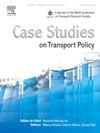Does experience drive potential buyers away? The influence of consumption values, emotions and experience on the purchase of battery electric vehicles
IF 2.4
Q3 TRANSPORTATION
引用次数: 0
Abstract
Consumption values influence consumer choices in many industries. However, prior experience does not appear to have been combined with consumption value theory to explain attitudes towards electric vehicles. According to consumption value theory, value is multi-dimensional and product choice is influenced by perceptions of utilitarian and emotional value. The objective of this study is to evaluate the extent to which perceived values, emotions and experience influence attitudes and purchase intentions. As a high involvement decision, car buying is generally considered from a utilitarian, cost-benefit perspective. By considering the emotional and experiential facets of decision making, this study contributes to the literature and extends the theory of consumption values. The findings are based on a survey of older, higher income car buyers (n = 340), a segment that might convert from conventional to battery electric vehicles. Data analysis consists of partial least squares structural equation modeling. The results show that anticipated emotions, contextual change, charging anxiety and hedonic value have a significant effect on attitudes, which drive purchase intentions. The results show that prior experience is a double edged sword: although prior experience weakens charging anxieties, it dampens emotions. Several recommendations for policy makers and practitioners are made to promote the diffusion of battery electric vehicles in Australia and other laggard markets.
体验会让潜在买家离开吗?消费价值观、情感和体验对纯电动汽车购买的影响
消费价值观影响着许多行业的消费者选择。然而,之前的经验似乎并没有与消费价值理论相结合来解释对电动汽车的态度。根据消费价值理论,价值是多维度的,产品选择受到功利价值和情感价值观念的影响。本研究的目的是评估感知价值、情绪和经验对态度和购买意愿的影响程度。汽车购买作为一种高介入决策,通常是从功利主义、成本效益的角度来考虑的。通过考虑决策的情感和经验方面,本研究对文献有所贡献,并扩展了消费价值理论。这些发现是基于对年龄较大、收入较高的购车者(n = 340)的调查得出的,这一群体可能会从传统汽车转向纯电动汽车。数据分析采用偏最小二乘结构方程模型。结果表明,预期情绪、情境变化、收费焦虑和享乐价值对态度有显著影响,态度驱动购买意愿。研究结果表明,先前的经验是一把双刃剑:虽然先前的经验会减弱焦虑,但它会抑制情绪。为政策制定者和从业者提出了一些建议,以促进电池电动汽车在澳大利亚和其他落后市场的推广。
本文章由计算机程序翻译,如有差异,请以英文原文为准。
求助全文
约1分钟内获得全文
求助全文

 求助内容:
求助内容: 应助结果提醒方式:
应助结果提醒方式:


